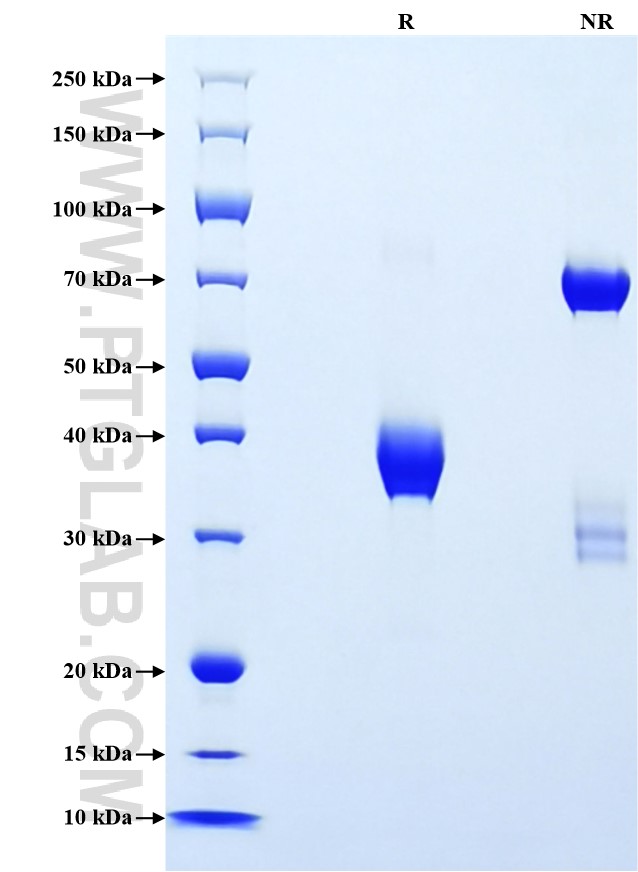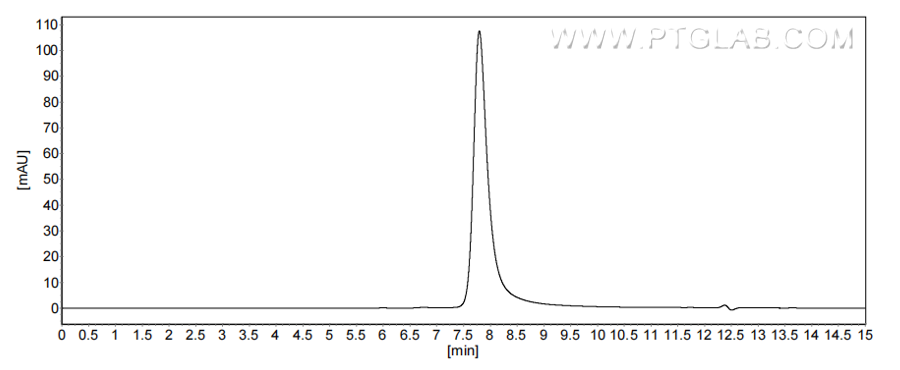Recombinant Mouse CXCL5 protein (rFc Tag) (HPLC verified)
种属
Mouse
纯度
>90 %, SDS-PAGE
>90 %, SEC-HPLC
标签
rFc Tag
生物活性
未测试
验证数据展示
产品信息
| 纯度 | >90 %, SDS-PAGE >90 %, SEC-HPLC |
| 内毒素 | <0.1 EU/μg protein, LAL method |
| 生物活性 |
Not tested |
| 来源 | HEK293-derived Mouse CXCL5 protein Val45-Ala118 (Accession# P50228) with a rabbit IgG Fc tag at the C-terminus. |
| 基因ID | 20311 |
| 蛋白编号 | P50228 |
| 预测分子量 | 34.3 kDa |
| SDS-PAGE | 33-40 kDa, reducing (R) conditions |
| 组分 | Lyophilized from 0.22 μm filtered solution in PBS, pH 7.4. Normally 5% trehalose and 5% mannitol are added as protectants before lyophilization. |
| 复溶 | Briefly centrifuge the tube before opening. Reconstitute at 0.1-0.5 mg/mL in sterile water. |
| 储存条件 |
It is recommended that the protein be aliquoted for optimal storage. Avoid repeated freeze-thaw cycles.
|
| 运输条件 | The product is shipped at ambient temperature. Upon receipt, store it immediately at the recommended temperature. |
背景信息
CXCL5 is a member of the ELR+ CXC chemokine family, whose members contain a highly conserved three amino acid motif (ELR+) that promotes angiogenesis and is highly associated with aberrant angiogenesis. CXCL5 is an important chemokine secreted by immune cells, such as monocytes and T lymphocytes. Recent studies indicated that CXCL5 is aberrantly expressed in >14 different types of cancer, including hepatocellular carcinoma, prostate cancer, pancreatic cancer, and gastric cancer. Antibody neutralization of CXCL5 in experimental models of human non-small-cell lung cancer decreased tumor angiogenesis and metastasis.
参考文献:
1. Robert M Strieter.et al. (2004) Semin Cancer Biol. 14(3):195-200. 2. R M Strieter.et al. (1995) J Biol Chem. 270(45):27348-57. 3. Morgan O'Hayre.et al. (2008) BiochemJ. 409(3):635-49. 4. Gildas Lepennetier.et al. (2019) J Neuroinflammation. 16(1):219. 5. Wen Zhang. Et al. (2020) Cancer Commun (Lond). 40(2-3):69-80.

